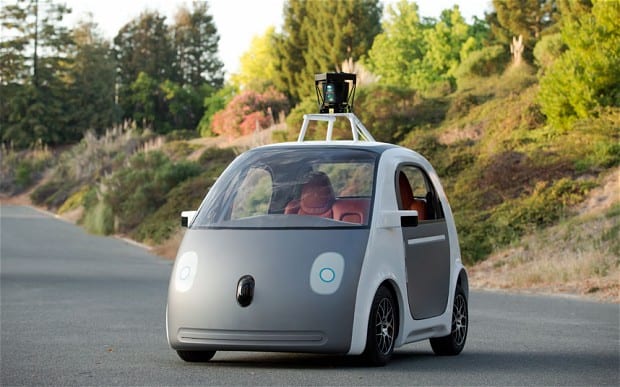Google has unveiled the first of 100 autonomous test vehicles. That’s right, driverless cars with no steering wheels, controlled by sensors (and presumably Google Maps) with a top speed of 25mph.
 It sounds like science fiction but the technology is very much of today; Audi, BMW, Mercedes, Lexus and others have all showcased autonomous vehicle technology in recent years. In fact, Subaru started talking about the concept of driverless vehicles way back in 1939.
It sounds like science fiction but the technology is very much of today; Audi, BMW, Mercedes, Lexus and others have all showcased autonomous vehicle technology in recent years. In fact, Subaru started talking about the concept of driverless vehicles way back in 1939.
In reality, drivers began the long process of handing over the controls of their motor vehicles to computers years ago, with the advent of innovations like ABS, parking sensors, cruise control, even the venerable automatic gearbox.
But despite the toy-like car developed by Google and unveiled this week and the fact that the technology exists, at least in some fashion, it is this writer’s belief that truly autonomous motoring won’t be here in earnest for many years yet.
Here’s why…
[accordion]
[acc_item title=”Legislation”]
The 1968 Vienna Convention states that “every driver shall at all times be able to control his vehicle”, making driverless cars effectively illegal.
The US is not one of the 72 parties signed up to the European convention, which probably explains why car makers in the States are somewhat ahead of their European counterparts.
As with any legislation, it is of course open to interpretation. The Swedish government, for example, believe that, because the convention refers to the driver’s capability rather than the car’s, autonomous vehicles should not be precluded. But the Germans say that a driverless vehicle is a straight contravention of the law.
In any case, getting that legislation changed to fully allow the technology will not be the work of a moment.
[/acc_item]
[acc_item title=”Insurance”]
Naturally, a huge part of the business case for the development of autonomous vehicles is the drive for safety on the roads. Google says it took the steering wheels out of its cartoon car to improve safety, suggesting that the propensity for human men and women to attempt to override the autonomous vehicle’s systems by grabbing the wheel actually caused accidents.
That points to humans’ natural distrust of handing over the reins completely to technology. More of that later…
But assuming that, while such advanced technology will doubtless reduce accidents by minimising the effect of human error, it surely cannot make accidents impossible, who would be liable in the case of an accident involving a driverless car?
No motorist I know is going to shoulder the blame for a shunt in which they can prove unequivocally that they were NOT at the controls of the car. So who gets the blame? The car maker? Google? It’s an insurance nightmare that only becomes even more complex when you take into account…
[/acc_item]
[acc_item title=”Hackers”]
In 2013, a US journalist was killed in a car crash and the resulting investigation revealed that the accident may have been caused by someone hacking into the computer system of the Mercedes 250 Coupe he was driving.
University research revealed that it is relatively easy to hack into the control system of a car, causing any number of destructive actions, like slamming the accelerator on, or disabling the brakes.
If that is true for a car that is very far from autonomous, imagine what hackers could do to cars in which drivers have no control whatever already.
[/acc_item]
[acc_item title=”Systems”]
A global system needs to be put in place for all autonomous vehicles. It’s all very well car makers coming up with their own takes on how driverless technology could be played out but unless all autonomous vehicles recognise not only each other, as well as every nation’s stop lights and other traffic signs, carnage will surely ensure.
Like the legislation issue, this is something that will take a very long time to overcome.
[/acc_item]
[acc_item title=”Trust”]
Ok, these last two items on my list are the more emotionally-based considerations but they will have a bearing on how or, indeed, whether autonomous vehicles ever take off.
Google has already encountered the psychological difficulty humans have with surrendering every element of control.
We humans have been driving cars since 1886 so I guess it’s going to take a while for us to feel comfortable enough to put our fate in the hands of technology. And, let’s face it, how many days go by without someone you know cursing much less advanced technology going wrong? Not many, I’d wager, whether it be phones, IT, printers, TVs, games consoles…
[/acc_item]
[acc_item title=”Petrolheads”]
The world is chock full of people who actually enjoy driving and don’t see it as a massive chore. Sure, traffic jams on the daily commute can make it seem less glamorous but, in terms of earthly passions, the desire for automotive performance, style and beauty ranks very high. A million people read Autocar magazine every week alone, while five million tune in to Top Gear on a Sunday evening.
Of course, the flipside to this is Google’s assertion that the peril of drunk and distracted drivers would be removed from our roads if all cars were autonomous. Admittedly, eliminating the scourge of idiocy that is texting, applying make-up, conducting phone conversations or taking selfies while driving would be a good thing.
But, for the many millions of genuine car fans out there, it will take a massive amount of persuasion to get them to let go of the steering wheel for good.
[/acc_item]
[/accordion]
Andy

















